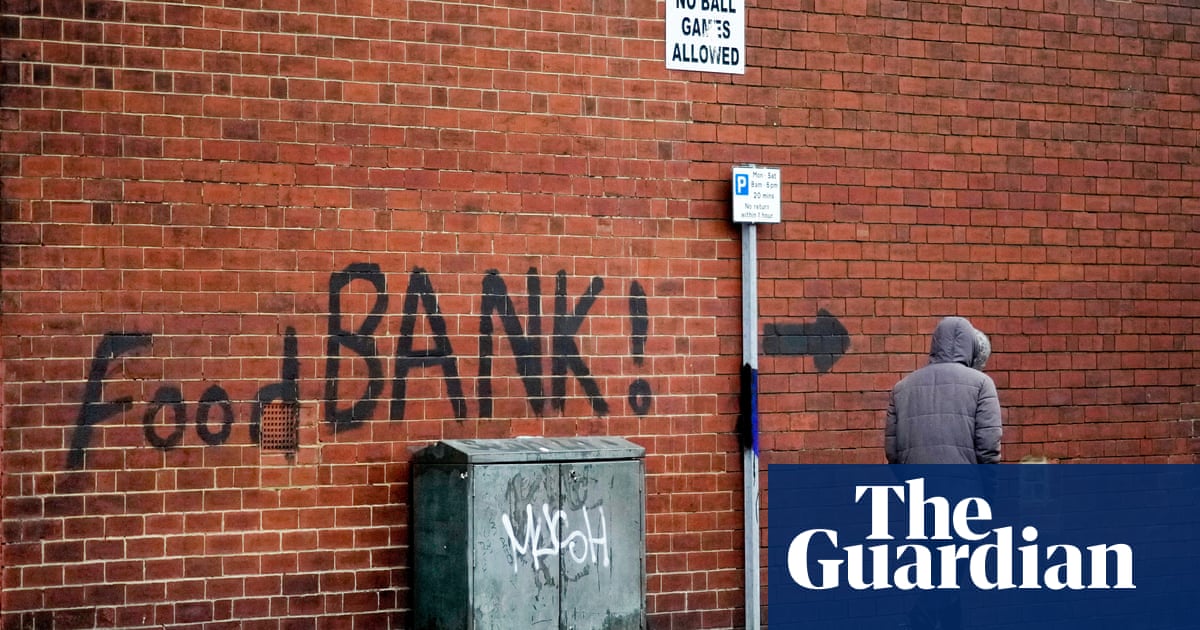Keir Starmer has been warned that Labour’s tough stance on benefits is costing Britain’s economy billions of pounds each year while adding to the pressure on public services by pushing more people into poverty.
With the government under fire over its planned benefit cuts, the anti-poverty charity Trussell said that failing to tackle hunger and hardship would have severe human costs and cause damage to the wider economy and public finances.
Attacking Labour’s drive to find savings from the welfare bill despite repeated promises that there would be no return to austerity, it said the UK’s elevated levels of poverty meant the economy was missing out on more than £38bn each year in potential output.
The intervention comes as the government prepares to publish its long-awaited strategy for tackling child poverty in June, amid the heightenedrisk of a rebellion by Labour MPsopposed to the £5bn benefit cuts announced by the chancellor, Rachel Reeves, in her spring statement.
It emerged last week that ministers areprivately ruling out scrapping the controversial two-child limitintroduced under the Conservatives, despite warnings from charities that a failure to do so could result in the highest levels of child poverty since records began.
Criticising the government’s benefit cuts and urging ministers to rethink their resistance to abolishing the two-child limit, Trussell argued that any narrow savings on the welfare bill should be viewed in the context of the wider costs to the UK economy, public finances and personal wellbeing.
In a report commissioned by the charity from experts at the consultancy WPIEconomics, it said the UK was missing out on the full contributions of millions of people struggling in severe hardship.
It said as many as 9.3 million people in Britain faced hunger and hardship in the financial year ending in March 2023, including as many as 6.3 million adults and 3 million children. It defined a family as facing hunger and hardship if it was more than 25% below a poverty line set by the Social Metrics Commission, which measures a household’s savings and income.
Linking the impact of financial hardship on people’s chances of gaining and maintaining stable employment, it said lower levels of employment and weakness in productivity meant the economy was missing out on £38.2bn in annual output.
Without this contribution, the Treasury was also missing out on £18.4bn in tax revenues, and needed to spend about £5.3bn on social security payments to support people who were unemployed or receiving in-work benefits.
The higher likelihood that people in deep poverty require support from the NHS, social care services, homelessness support and the education system also meant there was a cost to the exchequer from high levels of poverty of about £13.7bn.
Part of this was down to an additional £1.5bn of spending allocated to schools to support children in poverty, such as free school meals and the pupil premium.
Although Trussell said the costs could not be immediately overcome, because policy changes take time to benefit a household’s financial position, it urged ministers to move quickly to revise their position on key benefit policies.
It said abolishing the two-child limit would lift 670,000 people out of facing hunger and hardship, including 470,000 children. This would lead to a reduction in costs to the economy, public services and the exchequer of more than £3bn.
While calling for an “urgent rethink” on planned cuts to disability benefits, it said there was also a need to update universal credit so that it protected more people from hunger and hardship through an “essentials guarantee” that could lift more than 2 million people out of deep poverty.
Helen Barnard, the director of policy, research and impact at Trussell, said: “Slashing support for disabled people who most need our collective protection from hunger is cruel, irresponsible, and out of touch with what the public wants. It risks piling even more pressure on public services and damaging our economy.
“The UK government has a moral and economic responsibility to tackle hunger, as more people risk being forced to the doors of food banks if nothing changes … There is a better way. Turning this tide would have huge benefits, not just to individuals, but for us all.”
A DWP spokesperson said: “We have set out a sweeping package of reforms to health and disability benefits that genuinely supports people back into work and lifts people out of poverty, while putting the welfare system on a more sustainable footing so that the safety net is always there to protect those who need it most.
“Our £1bn employment support package will unlock work as part of our Plan for Change, alongside increasing the living wage, boosting benefits, and introducing a fair repayment rate to help more than a million low-income households on universal credit.”
